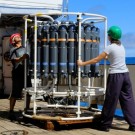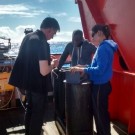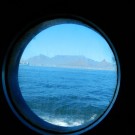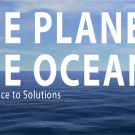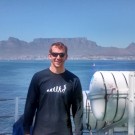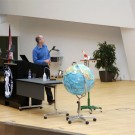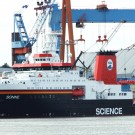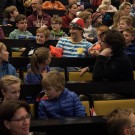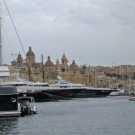It’s another day at the FS Meteor and although it’s been only 4 days since we left Cape Town – South Africa – which is a beautiful place that I have to come back again – , it feels that we are here for weeks now. I don’t know if it’s the great interaction between […]
2th March, 2016 It is one more day of calm waters. As every day the shift of my team began at 8 a.m. after breakfast. Then, we tried to fix the uCTD and we could do it. The routine in these three days are being very busy, we don’t stop, because every time we have […]
Day one of many
And so our first full day at sea came and all sight of land vanished. Our bodies adjusted to the constant motion of the ocean and the protein rich German diet. Our time for procrastinating was gone. It was time to start working! In addition to our thematic personal projects, students were assigned into shifts […]
A MOOC gets a Name
One Planet – One Ocean: From Science to Solutions Whew! Another milestone in our MOOC production – the MOOC films are on their way to Kiel. The suspense is hardly bearable; we will see the final videos for the first time! But I’m getting ahead of the story. My last blog post announced the end […]
R/V METEOR M124 – Pass the CTD, please.
Today (29 February 2016) marks the beginning of scientific cruise M124 on board the legendary German Research Vessel – FS Meteor. Departing from Cape Town, South Africa in the capable hands of Captain Michael Schneider, the Meteor’s 32 crew and 27 scientists (of 10+ nationalities) set out to research the South Atlantic Ocean. The M124 […]
Von der Kieler Förde zum Mars: Bei der Kinderuni ging es auf Entdeckungsreise auf den roten Planeten
Seit jeher beschäftigt die Menschen die Frage, wie es auf den anderen Planeten des Sonnensystems aussieht. Besonders um den Mars ranken sich viele Theorien. Im Rahmen der Kinderuni referierte Prof. Dr. Robert Wimmer-Schweingruber vom Institut für Experimentelle und Angewandte Physik der Christian-Albrechts-Universität zu Kiel gestern über die Erforschung des roten Nachbarplaneten. Der Fokus seines Vortrages […]
Adventskalender-Wochentürchen III: Von den Anfängen der Deutschen Forschungsflotte bis heute
Deutsche Meeresforscherinnen und -forscher sind zu jeder Jahreszeit auf Forschungsschiffen unterwegs, in Nord- und Ostsee ebenso wie im Atlantik, dem Pazifik oder den Polarmeeren. Die deutsche Forschungsflotte besteht heute aus den acht Forschungsschiffen Polarstern, Meteor, Maria S. Merian, Poseidon, Alkor, Heincke, Elisabeth Mann Borgese und Sonne. Sie wurden speziell für die Belange der Meeresforschung konstruiert […]
Haie, Wale, freche Robben – Tauchexpedition in eine unbekannte Welt
800 Schülerinnen und Schüler, zum Teil in elterlicher Begleitung, fanden sich am Mittwoch im Audimax der Christian-Albrechts-Universität zu Kiel ein. Während draußen Groß und Klein Schlange standen, füllten sich im Hörsaal langsam die Ränge. Die Großen nach hinten, die Kleinen nach vorne, damit auch alle etwas sehen. Zwischen dem Anfangstrubel sortierte der Kieler Meeresbiologe und Forschungstaucher von […]
Future Ocean MOOC shooting in Malta
The scope of the Future Ocean’s massive open online course (MOOC) that is in production in Kiel is expanding to include perspectives from other parts of the world! How do people perceive the ocean in other countries? What state of the ocean do we want to achieve? What is the potential on the one hand […]
Adventskalender-Wochentürchen II: Entwicklung der Meeresforschung
+++ Dies ist der zweite Adventskalender-Beitrag vom Ocean-Navigator. Nächsten Sonntag gibt es mehr zur Entwicklung der Ozeanforschung. Viel Spaß beim Lesen! +++ Im letzten Beitrag ging es um die Challenger Expedition. Sie war die größte und kostspieligste Expedition der viktorianischen Epoche. Auch wenn es sich über 20 Jahre hinzog, dieses Riesenunterfangen auszuwerten, stand die Meeresforschung […]
